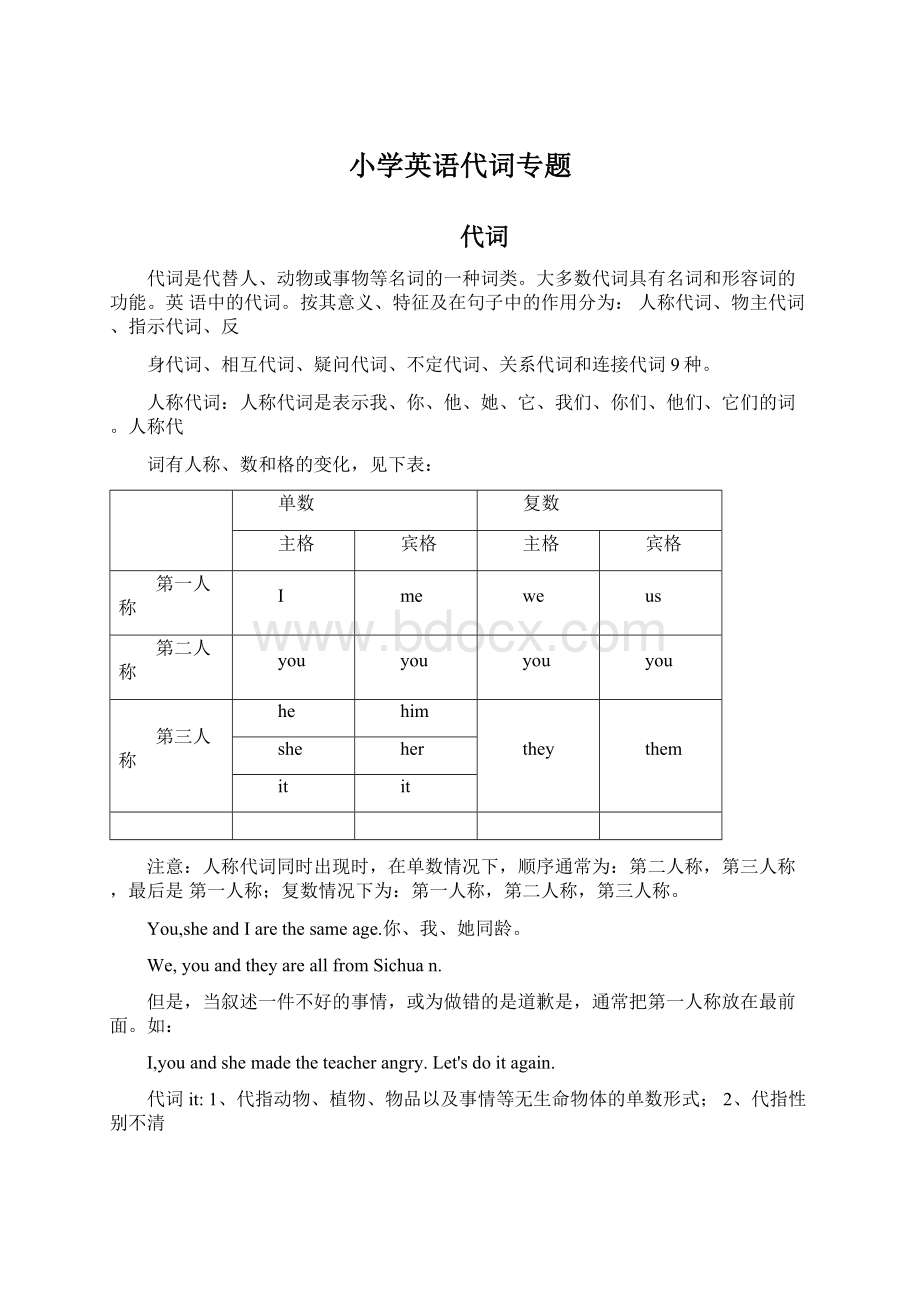小学英语代词专题Word下载.docx
《小学英语代词专题Word下载.docx》由会员分享,可在线阅读,更多相关《小学英语代词专题Word下载.docx(15页珍藏版)》请在冰豆网上搜索。

1、代指动物、植物、物品以及事情等无生命物体的单数形式;
2、代指性别不清
楚(婴儿)、身份不明的单数的人;
3、代指天气、时间、距离等概念,作主语。
小练习:
根据汉语或语境填写适当的人称代词。
1.amateacher.Andallthestudentslike.(我)
2.oftenplaysbasketballafterschool.Ioftenwatch(他)
3.(我们)buyapairofshoesfor(她).
4.---OurnameareSamandToaretwins.
---Doyouwanttomakefriendswith.
5.---Howistheweathertoday?
---issunny,butalittlecold.
物主代词:
物主代词是表示所有关系的代词,也就是指某物或者某人是属于谁的关系,又
可以叫做代词所有格。
物主代词分为形容词性物主代词和名词性物主代词,有性别的区分,有人称和数的变化,并与他们的人称代词对应。
数
人称
-一一
-二二
-三
形容词性
my
your
his/her/its
our
their
名词性
mine
yours
his/hers/its
ours
theirs
名词性物主代词的句法功能:
1、作主语,如:
MayIuseyourpen?
Yoursworksbetter.
2、作动词宾语,如:
Mypenislost.CanIuseyours?
3、作介词宾语,如:
Mypenislost.CanIwritealetterwithyours?
4、作主语补语,如:
ThelifeIhaveisyours.
名词性物主代词与of属格连用
aphotoofme强调照片里的人是我)
aphotoofmine(强调照片是属于我的,没说明照片里的人是谁)
小练习:
根据提示和语境填入适当的物主代词或人称代词。
1.(他的)coatisblack,but(她的)isred.
2.whosewalletisthis?
It'
s(我的).lt'
s(我的)wallet.
3.1'
msnewstudent.nameisHellen.
4.---Arethese(你们的[skateboards?
---Yes,theyare(我们的)
5.Nancyismycousin.eyesarebig.
6.Look,thisishisbook.(我的)isasnewashis.
7.Canshowbook?
(你能把你的书借给我看一下么?
)
8.Thisisnot(I)shirt.It'
s(he).
9.arelisteningtotheradio.Don'
ttalkto(他们).
10.(我们)willbuyapairofshoesfor(他).
指示代词:
指示代词表示那个that、这个this、那些those这些these等概念的代词。
代指
人或事物。
指示代词的句法功能:
1、作主语,如:
Thisisthewaytodoit.
3、作介词宾语,如:
5、作限定词,如:
Ilikethisbetterthanthat.
Idon'
tsaynotodothat.
Mypointisthis.
Thisgirlisournewclassmate.
指示代词作主语时可以指物也可以指人,但作其他句子成分时只能指物,不能指人。
如:
Thatismyteacher.
Heisgoingtomarrythisgirl.
Iboughtthis.
1.---WhatareinEnglish?
---They'
rebasketballs.
A.thisB.these
C.they
2.---Hello!
IsMissGreenspeaking?
---No,isCindyspeaking.
A.that,thatB.you,IC.that,this
3.Thatisnotatalltree.改为复数句)
4.Isthisyourhat?
改为复数句)
5.Thesebluepencilsaremine改为单数句)
6.Whatcolorarethosefish?
改为单数句)
反身代词:
表示我自己,你自己他自己,我们自己,你们自己他们自己等的词叫做反身代词。
1反身代词第一,二人称构成是由形容词性物主代词加"
-self"
(复数加-selves)构成。
第三人
称反身代词是由人称代词宾格形式加-self(复数加-selves)构成。
myself
Ourselves
yourself
Yourselves
himself
themselves
herself
itself
不定人称
oneself
反身代词的用法:
1•主语和定语为同一人时,用反身代词。
2、表强调语气时,用反身代词。
3、反身代词常用于某些词组。
Helponeselfto随便吃/喝些
Yourshouldtakecareofyourself.
Imyselfcandoit.
enjoyoneself过得很愉快byoneself单独独自
learnsth.byoneself自学
1.wasadoctor.(他本人就是一位医生)
2.istooyoungtolookafter.(她年纪太小,不能照顾自己。
)
3.WeatthepartylastSunday.
A.enjoyedmyselfB.enjoyedourselvesC.enjoyedourself
4.LetTonydoitby.HeisnoIongerakid.(他不再是小孩子)
A.himB.hisC.himself
5.Youaretwelvenow.mustlookafter.
A.You,yourselfB.Your,yourselfC.You,your
6.Sheandhermotherenjoyedattheparty.
A.herselfB.themC.themselves
疑问代词:
疑问代词在句子中用来构成特殊疑问句,主要用于询问何人、何物、什么。
常用的疑问代词有:
who,whose,which,what.
1.who只能用于对人的提问,意为:
谁。
Whoisondutytoday?
Whoknowsthegirlinred?
2.whose也用于对人的提问,询问所有关系,意为:
谁的。
Whosebookisthis?
Whosepencilarethoseinthepencil-case?
3.which可用于对人、事、物的提问,意为:
哪一个。
Whichoneisyourbrother?
Whichonedoyoulikebest,anapple,abananaoranorange?
4.what可用于对事或物的提问,意为:
什么。
Whatareyoudoing?
Whatdayisittoday?
5.when可用于对时间的提问,意为:
什么时候
Whendoyougotothepark?
Practice
一用适当疑问代词填空:
1.isyourmathteacher?
2.subjectishetalking?
3.wenttoseetheheadmasteroftheschoolyesterday?
4.Fordidhebuyaticket?
5.doyouprefer,riceofbread?
二把下列句子译成英语:
1.这是谁的自行车?
2.哪一支铅笔是你的,蓝的还是红的?
六、不定代词
不是指明代替任何特定名词的代词叫不定代词。
常见的不定代词有all,both,each,every,
some,any,many,much,(a)few,(a)little,one,ones,either,neither,other,another,no,none以及含有some-,any-,no-等的合成代词(如:
anybody,something,noone>。
这些不定代词大都可以代替名词和形容词,在句子中作主语、宾语、表语和定语。
但none和由some,any,no,everything,-body,-one构成的复合不定代词(如somebody等)只能作主语、宾语和表语;
而every和no只能作定语。
不定代词的形式:
不定代词
词义
复合形式
说明
some
一些(可数或不可数)
something某物、某事someone某人somebody某人
一般用于肯定句
any
一些,任何(可数或不可数)
anything任何事物anyone任何人anybody任何人
一般用于否定句,疑问句或条件状语从句中
no
没有,无
nothing无物nobody无人noone无一人
修饰可数或不可数名词,复合形式
只具有名词的作用
every
每个,所有的
everything每一个事物,一切everyone每人everybody人人
强调共性,词义和all相近
all
全体、所有的
这里表示这里表示
代替或修饰可数名词时,指两个以上的人或物,也可代替或修饰不可数名词。
each
每个
强调个性,指两个或两个以上的人或物。
few
很少(可数)
表示否定
afew
一些,几个(可数)
表示肯定
little
很少(不可数)
alittle
一些(不可数)
many
很多(可数)
much
很多(不可数)
both
两个,两者都
这里表示
仅指两个人或物
neither
没有人或物
none
这里表示
这里表示
指两个以上的人或物,当指可数名词时,谓语动词用单、复数都可以。
either
other(s)
另一个(些)
another
另外一个,又一
相当于another
个
one
一个(人或物)
one的复数形式是ones
不定代词的用法:
1.不定代词可作主语,当作主语时,要明确这一不定代词究竟是单数还是复数,以确定它和谓语动词在人和数的一致。
2.不定代词还可作定语,当作定语时,应该注意其所修饰的名词是可数还是不可数,以确定这个名词用单数还是复数。
例1Weshouldlearntogetonwellwith.
A.otherB.others
C.theotherD.theothers
答案:
B
提示:
other泛指另外的,其他的,后面一般接名词,theother特指两者中的另一
个(单数),theothers特指在某个范围中的其他人或物(复数),others泛指其
他人或物(复数)。
本句意思与别人友好相处是泛指。
例2Wouldyoulikesomecoffee?
Yes,just.
A.alittleB.little
C.afewD.few
A
alittle与little修饰不可数名词,前者是有肯定的含义而后者有否定的含
义。
afew与few修饰可数名词,前者有肯定的含义,而后者有否定的含义。
在句中coffee是不可数名词,答句中是肯定的意思。
另外如果有just
或only修饰只能用alittle或afew。
例3ofthestudentspassedtheexamTheyallfailed.
B.None
D.All
A.Neither
B
none与all用于二者以上的复数,none为否疋,all为肯疋。
both与neither用于两者,both为肯疋,neither为否疋,原句中Theyallfailed暗示说明没有一个人通过,要用none表示否定。
C.Both
例4LetLinTaodoitby,HeisnoIongerakid.
A.him
C.himself
C
本题是反身代词的用法,句中的by是介词,后面接人的代词的宾格或名
词性物主代词,或反身代词,作它的宾格。
byoneself是固定搭配强调“独立、单独”。
例5-Whydon'
twetakealittlebreak
-Didn'
twejusthave?
A.itB.that
C.oneD.this
C
one替代上文中的alittlebreak。
leavestheclassroomlastoughttoturnoffthelights.
B.Theperson
D.Who
Whoever相当于anyonewho(thepersonwho)
>复习时需要注意的要点
(1)some和any的用法
some常用于肯定句,any常用于疑问句、否定句及条件状语从句。
但在表示请求、建议、反问的疑问句里,则用some。
例如:
1)Wouldyoulikesomecoffeeorsometea?
2)Ifyouhavequestions,youcancomeanytime.
(2)all指物时,谓语动词用单数,在语法上是单数,而在概念上是复数。
指人时,一般作复数。
例如:
1)Allisnotgoldthatglitters.
2)Allarehere.
(3)each和every都是单数概念,但every只能作形容词;
each可以作代词和形容词。
1)Eachofushasgotanewbook.
2)Everystudentisdoinghisbestatschool.
(4)one,theother,another,others和theother的用法
总共只有两个人或两样东西时,其中的一个是one,另一个是theother。
1)Ihavetwouncles,oneisateacher,theotherisanengineer.
总共有两个以上的人或事物,其中的第一个为one,其他的两个或两个以上为theothers。
1)ThereareonlytenboystudentsinClassOne.Theothersaregirlstudents.
第三节巩固练习
I.选择
A.He,youandI
B.
He,Iandyou
C.You,heandI
D.
I,youandhe
2.
Myparentsboughtanewschoolbagfor__
A.them
C.me
3.
Withmyparentsawayfromhome.Ihavetocook_
meals.
A.forme
formyself
4.
DonandIfoundlyingongroundwhenweworkup.
A.themselves
ourselves
C.them
5.
—Who'
s?
—isspeaking,Mr.Wang.
A.thisThis
thatThat
C.thatThis
thisThat
1.
willspendthewinterholidayinHanna(海南)Island.
6.LamisoftencomparedtoTaiwanesesingerJayChoubecausebothwrite
ownsongsandaredevelopingR&
Bstyle.
A.their…theirB.their…they
C.they…theirD.they…they
7.Idon'
tthinkthisisagoodsuggestion.Haveyouanyones?
A.anotherB.other
C.theother
D.others
8.
—HowGreekdoyouknow?
—Iamsorry.Iknowaboutit.It
A.many…fewB.much…little
9.It'
ss_e_tualkingwithoutdoing.
A.notB.noC.none
10.HerbrothersandsistersarecollegestudentsinShanghai.
A.allB.bothC.neitherD.either
11.—Whichofthesetwobicyclesdoyouliketheredoneortheblackone?
—Ilikeofthem.
A.someB.eitherC.allD.any
12.Heswimsfasterthanboyinhisclass.
A.anyB.theotherC.alltheotherD.anyother
13.peopleinShanghaigoswimminginfreezingweather.
A.FewB.AfewC.LittleD.Alittle
14.Idon'
tthinkoftheanswersiscorrect.
A.neitherB.eitherC.bothD.all
15.OnlyLiMingandWangPingstayedatschoolforthewallnewspaper.Whereare?
A.allB.theotherC.othersD.theothers
16.ofusisworkinghardtomakeourcountryricherandstronger.
A.EachB.EveryC.EveryoneD.Everyone
17.Weneedcolorchalk.Haveyougot?
A.some…someB.some…anyC.any…anyD.any…some
18.Ifyoudon'
twantofthosetwotrains,thereisoneat10:
30.
A.any…anotherB.either…anotherC.both…theotherD.either…another
19.—Haslostthiswatch?
—Yes,butwecan'
tfindoutwho.
A.anybodyB.someoneC.oneD.some
20.ofthemarefamousdoctors,butofthemhasbeentoBritain.
A.Both…bothB.Neither…neitherC.EithereitherD.Both…nether
II.把下列句子译成英语(选用括号内的不定代词)
1.你昨晚吃得多吗?
(much,many)
2.